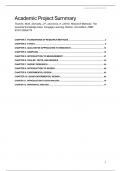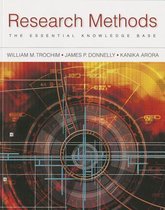Academic Project (6012S0010Y)
Academic Project Summary
Trochim, W.M., Donnelly, J.P., and Arora, K. (2016). Research Methods: The
essential knowledge base. Cengage Learning, Boston, 2nd edition, ISBN
9781133954774
CHAPTER 1. FOUNDATIONS OF RESEARCH METHODS ............................................................ 2
CHAPTER 2. ETHICS .................................................................................................................. 9
CHAPTER 3. QUALITATIVE APPROACHES TO RESEARCH...................................................... 14
CHAPTER 4. SAMPLING ........................................................................................................... 18
CHAPTER 5. INTRODUCTION TO MEASUREMENT................................................................... 27
CHAPTER 6. SCALES, TESTS, AND INDEXES .......................................................................... 35
CHAPTER 7. SURVEY RESEARCH ........................................................................................... 39
CHAPTER 8. INTRODUCTION TO DESIGN ................................................................................ 49
CHAPTER 9. EXPERIMENTAL DESIGN ..................................................................................... 55
CHAPTER 10. QUASI-EXPERIMENTAL DESIGN ........................................................................ 63
CHAPTER 11. INTRODUCTION TO DATA ANALYSIS ........................................................................ 70
CHAPTER 12. INFERENTIAL ANALYSIS ......................................................................................... 77
1
, Academic Project (6012S0010Y)
Chapter 1. Foundations of Research Methods
The Research Enterprise
• Research: A type of systematic investigation that is empirical in nature
and is designed to contribute to public knowledge.
• Research enterprise: The macro-level effort to accumulate knowledge
across multiple empirical systematic public research projects.
• Translational research: The systematic effort to move research from
initial discovery to practice and ultimately to impacts on our lives.
• Research-practice continuum: The process of moving from an initial
research idea or discovery to practice, and the potential for the idea to
influence our lives or world.
• Basic research: Research that is designed to generate discoveries and to
understand how the discoveries work.
• Applied research: Research where a discovery is tested under
increasingly controlled conditions in real-world contexts.
• Implementation and dissemination research: Research that assesses
how well an innovation or discovery can be distributed in and carried out in
a broad range of contexts that extend beyond the original controlled
studies.
• Impact research: Research that assesses the broader effects of a
discovery or innovation on society.
• Policy research: Research that is designed to investigate existing policies
or develop and test new ones.
• Research synthesis: A systematic study of multiple prior research
projects that address the same research question or topic and that
summarizes the results in
• a manner that can be used by practitioners.
• Meta-analysis: A type of research synthesis that uses statistical methods
• to combine the results of similar studies quantitatively in order to allow
general conclusions to be made.
• Systematic review: A type of research synthesis that focuses on a
specific question or issue and uses preplanned methods to identify, select,
assess, and summarize the findings of multiple research studies.
• Guideline: A systematic process that leads to a specific set of
researchbased recommendations for practice that usually includes some
estimates of how strong the evidence is for each recommendation.
2
, Academic Project (6012S0010Y)
• Evidence-based practice (EBP): A movement designed to encourage or
require practitioners to employ practices that are based on research
evidence as reflected in research syntheses or practice guidelines.
• Evolutionary epistemology: The branch of philosophy that holds that
ideas evolve through the process of natural selection.
Conceptualizing Research
• Requests for proposals (RFPs): A document issued by a government
agency or other organization that, typically, describes the problem that
needs addressing, the contexts in which it operates, the approach the
agency would like you to take to investigate the problem, and the amount
the agency would be willing to pay for such research.
• Literature review: A systematic compilation and written summary of all of
the literature published in scientific journals that is related to a research
topic of interest. A literature review is typically included int he introduction
section of a research write-up.
• Peer review: A system for reviewing potential research publications where
authors submit potential articles to a journal editor who solicits several
reviewers who agree to give a critical review of the paper. The paper is
sent to these reviewers with no identification of the author so that there will
be no personal bias (either for or against the author). Based on the
reviewers’ recommendations, the editor can accept the article, reject it, or
recommend that the author revise and resubmit it.
The Language of Research
• Theoretical: Pertaining to theory. social research is theoretical, meaning
that much of it is concerned with developing, exploring, or testing the
theories or ideas that social researchers have about how the world
operates.
• Empirical: Based on direct observations and measurements of reality.
• Probabilistic: Based on probabilities.
3
, Academic Project (6012S0010Y)
• Causal: Pertaining to a cause-effect relationship, hypothesis, or
relationship. something is causal if it leads to an outcome or makes an
outcome happen.
• Causal relationship: A cause-effect relationship. For example, when you
evaluate whether your treatment or program causes an outcome to occur,
you are examining a causal relationship.
• Descriptive studies: A study that documents what is going on or what
exists.
• Relational studies: A study that investigates the connection between two
or more variables.
• Causal studies: A study that investigates a causal relationship between
two variables.
• Cross-sectional study: A study that takes place at a single point in time.
• Longitudinal: A study that takes place over time.
• Repeated measures: Two or more waves of measurement over time.
• Time series: Many waves of measurement over time.
• Relationship: An association between two variables such that, in general,
the level on one variable is related to the level on the other. Technically,
the term “correlational relationship” is redundant: a correlation by definition
always refers to a relationship. however the term correlational relationship
is used to distinguish it from the specific type of association called a
causal relationship.
• Third variable or missing variable problem: An unobserved variable
that accounts for a correlation between two variables
• Positive relationship: A relationship between variables in which high
values for one variable are associated with high values on another
variable, and low values are associated with low values on the other
variable.
4





